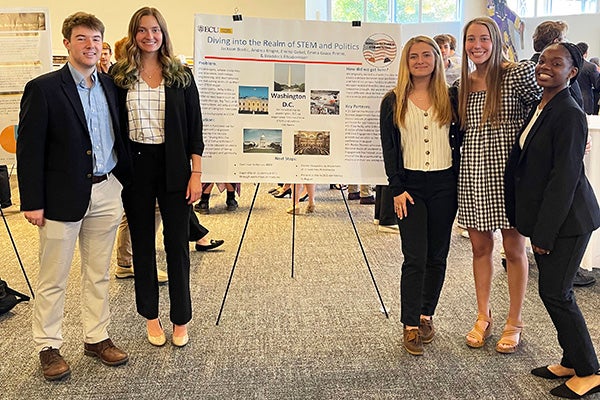Honors students create class to increase civic engagement in STEM majors
An increasing amount of research shows that students in the fields of science, technology, engineering and math (STEM) are less likely to vote than their non-STEM peers, according to data from universities nationwide. A group of students in the East Carolina University Honors College are working to change that, starting with their peers.

East Carolina University Honors College students Jackson Bostic, from left, Emma Gebel, Braddock Rhodenhiser, Emma Grace Primm and Andrea Knight present their project at the final HNRS 3000 class in April. (Contributed photo)
As a part of their first-year honors curriculum, Jackson Bostic, Emma Gebel, Andrea Knight, Emma Grace Primm and Braddock Rhodenhiser were given the topic of politics, which led to the issue of civic engagement. During the two classes — HNRS 2000 and 3000 — students work in teams to tackle a difficult issue and find possible solutions.
After workshopping a few ideas, the group decided that creating a class would be the best way to motivate and increase political engagement.
“Data showed that students in general, not just at ECU, but STEM majors (in general) have lower voting rates compared to non-STEM majors,” Gebel said. “So we decided to target education through this issue.”
While creating a university-wide class wasn’t a feasible first step, the team was able to meet with administrators and create an honors seminar class that will be offered in spring 2023. Seminars are smaller, discussion-based classes that allow students to learn about a variety of interesting topics that aren’t necessarily in their course of study.
“The Honors College is extremely excited to offer this seminar,” said Dr. Todd Fraley, Honors College interim dean. “This is the result of curious students seeking ways to engage classmates in conversations about the relationship between science and politics. They met with professors, honors administration and other ECU students who helped them develop a unique course offering.
“We hope this is the first of many seminars that emerge from student-led discussions and interests. It is also a great example of the valuable relationships our students develop with faculty during their time at ECU. We are very thankful for Dr. (Samantha) Mosier’s partnership on this project.”
Increasing engagement
After receiving approval to create a seminar, the students needed to find a professor interested in the topic and willing to serve as the course’s instructor. That person was Mosier, an assistant professor in the Department of Political Science.
“The class is interesting simply because it was students from the Honors College that were interested in developing it and had a vision of what it would look like. It is also pretty awesome that they had a particular type of student — STEM majors — in mind that I often don’t get a chance to teach,” she said. “I’m excited at the prospect of getting students who may have limited experience in politics and policy learning more about the role of science in policymaking. Many students within STEM do end up working in or around government and will be impacted by the politics in some capacity.”
The idea that politics doesn’t affect job opportunities in STEM was one of the reasons for low civic engagement, according to research conducted by the students.
“My biggest hope for the class is that students walk away with a better sense of how STEM is used and impacted by the political process,” Mosier said. “I’d like to think that this will better inform them on career choices upon graduation or how to become more politically active and engaged. I’m a huge advocate for getting more STEM majors educated on the benefits of public service careers and the need to be aware of how politics will impact their lives even if they try to avoid it.”
The process of creating the seminar has been informative for the team and is serving as their signature honors project, the final capstone project that honors students complete before graduating. This is only the first step in their long-term plans for the project.
“The seminar is, in our minds, the pilot program and then from there, we want to grow and expand whether it’s through ECU and to other universities,” Rhodenhiser said. “We’re still in the works of trying to figure out what sustainability would look like.”
The team plans to present Mosier with topics they’re interested in and ideas they think should be covered in the class, while also creating their own version of the curriculum that could be a template for other classes and universities. They have also been working with Dr. Eliza Reilly at the National Center for Science and Civic Engagement to present their findings at a conference.
“I feel like we really worked hard and even though for a while we were kind of spinning in circles, we kept working and I think we benefited from it,” Bostic said. “I never would have imagined that within two years we will have created a class and gotten a professor for it. I never thought I’d be talking to a professor at St. John’s University and an executive director for a national organization.”